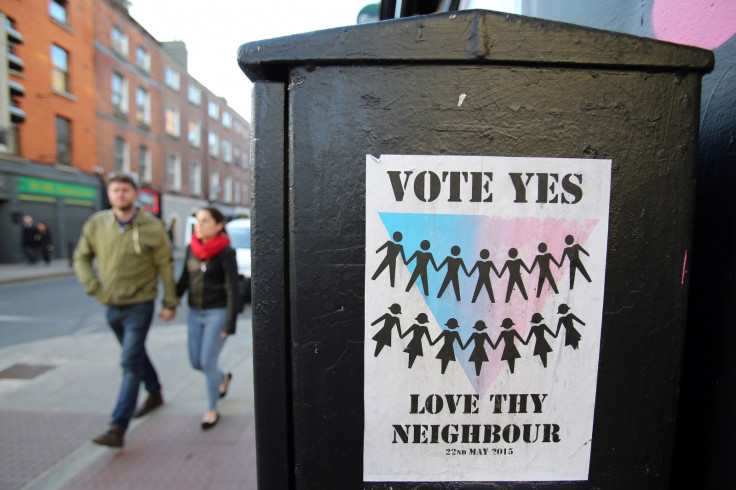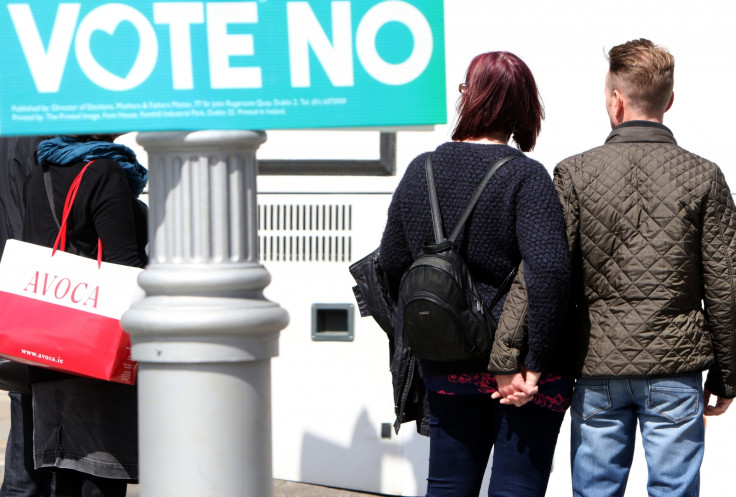Same-sex marriage referendum Ireland: Could no vote be poised to win?

Ireland is poised to hold a historic referendum to decide whether to extend marriage rights to gay couples, making it the first country to approve same-sex marriage by popular vote.
The most recent polls suggest Irish citizens will vote overwhelmingly in favour of changing Ireland's constitution, marking a significant turnaround on social attitudes in the predominantly Roman Catholic country.
A survey of 1,200 voters carried out by Ipsos MRBI for the Irish Times, taken a week ahead of the referendum, showed 58% planned to vote in favour, while 25% planned to vote against, and 17% were undecided. Other polls have put the 'yes' vote as high at 70%.
Polls are not always reliable, however. Ahead of the Ireland divorce referendum in 1995, a survey in May predicted a 'yes' vote at over 70%, but divorce barely made it over the line.
IBTimes UK spoke to Damian Loscher, managing director of Ipsos MRBI, about the likelihood of a 'yes' outcome on 22 May.
"The polls aren't wrong, what they are doing is measuring an opinion on a particular day. The question really is, to what extent will that be the outcome on [voting] day and how well does what people say a week out on the referendum translate into actual voting?" said Loscher.
"The indications are that people have given it a good deal of thought and are reasonably firm in the way they will vote. But will it be a 70/30 vote on the day? Polling companies will tell you this is highly unlikely. The general consensus is it might be closer to 60/40, but it is not going to be a 'no' vote."
Drifting vote
One of the reasons the polls conducted six months out from the divorce referendum were so inaccurate is because of a phenomenon Loscher calls a "drifting vote". As voters drift closer to decision day, there is usually a gradual drift from 'yes' to 'no'.
"We have had situations in the past where the 'yes' vote has collapsed in the last week or two, but that won't happen this time. It might drift but it won't collapse, because people are fairly certain in their own minds. On topics where people haven't yet made up their minds, we can't capture their vote in a poll a few weeks out."
The divorce referendum is a case in point. The poll which predicted the 'yes' vote at over 71% was taken in May, six months before polling stations opened in November. The vote drifted and the final tally, after a recount, was 50.3% in favour of ending the ban on divorce, while 49.7% opposed the change.
Yet in the week before the referendum, Ipsos MRBI predicted the vote result almost exactly. "We polled the divorce referendum at 51% 'yes' the week before, and it was almost perfect," Loscher says.
"But what happened in the months before is a slow drift from 'yes' to 'no', but it happened well in advance," he adds. "Divorce is such a big topic in Ireland, there was a lot of talk about it months in advance, and as it was talked about more people made up their minds, as they were standing to make up their minds, they were swinging to a 'no'. The polls captured that."

The undecided
Another of the reasons the 'no' vote is likely to be higher than estimated is because 'don't know' voters tend to swing towards a 'no'.
"Typically in referendums, undecided voters lean more towards a 'no' than a 'yes'. Our analysis shows 'don't know' voters would be attitudinally more inclined to vote 'no' than 'yes'. So they will add to the 'no' vote more than the 'yes' vote, which will narrow the margin."
Ahead of previous referenda, the outcome of the vote has differed from the polls because people were asked about something they had not fully considered or engaged with. This will not be the case in the same-sex marriage referendum, Loscher says, as it is a high-profile issue that has been debated extensively.
This may be less of an issue in the referendum on same-sex marriage, however. According to Ipsos MRBI research, around 80% of people in the company's polls have made up their minds.
"In situations where people feel they don't have information, their default can be a 'no'. But in this referendum, the issue has been played out quite a number of times in the media and most people are reasonably firm in their minds."
It is unlikely that a last-minute change of heart will dramatically change the vote in favour of a 'no', Loscher adds, because there should be no arguments which will sway people's thinking. Under Irish electoral rules, there is a ban on statements from all sides of the debate on the country's airwaves in the 24 hours ahead of a referendum.
Turnout
Turnout also directly impacts the likelihood of polls matching a vote result. "The people who tend to vote tend to be more conservative and they tend to be older, therefore what we often find, if there is a low turnout, that the status quo is favoured," Loscher says.
The turnout for referenda tends to be lower than for general elections, but the issue of gay rights may rile the younger generation into voting. "In this case, there seems to be a huge campaign among the younger generation, so it might have an impact. I still think the turnout will help a 'no' vote a bit, but not to the extent it has done in the past."
Social media, which has played host to 'yes' campaigners – and 'no' campaigners – could help increase the turnout of younger voters. One of the main campaigns, Yes Equality, established by the Gay and Lesbian Equality Network, has been extremely active on Twitter and Facebook.
Still, the turnout on Friday is likely to be within the usual range for referenda – between 53% and 50%. "It might be at the higher range, maybe mid-40s, but that would be a best guess from me," Loscher says.
© Copyright IBTimes 2025. All rights reserved.




















